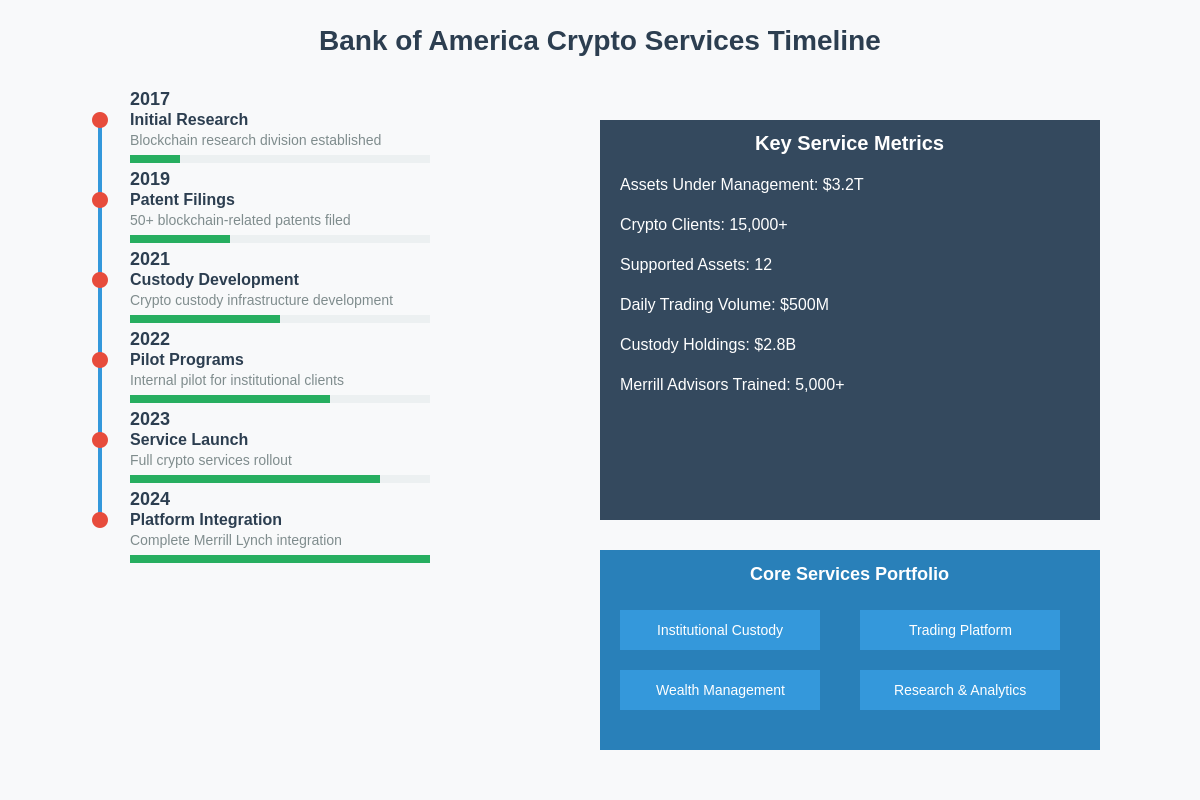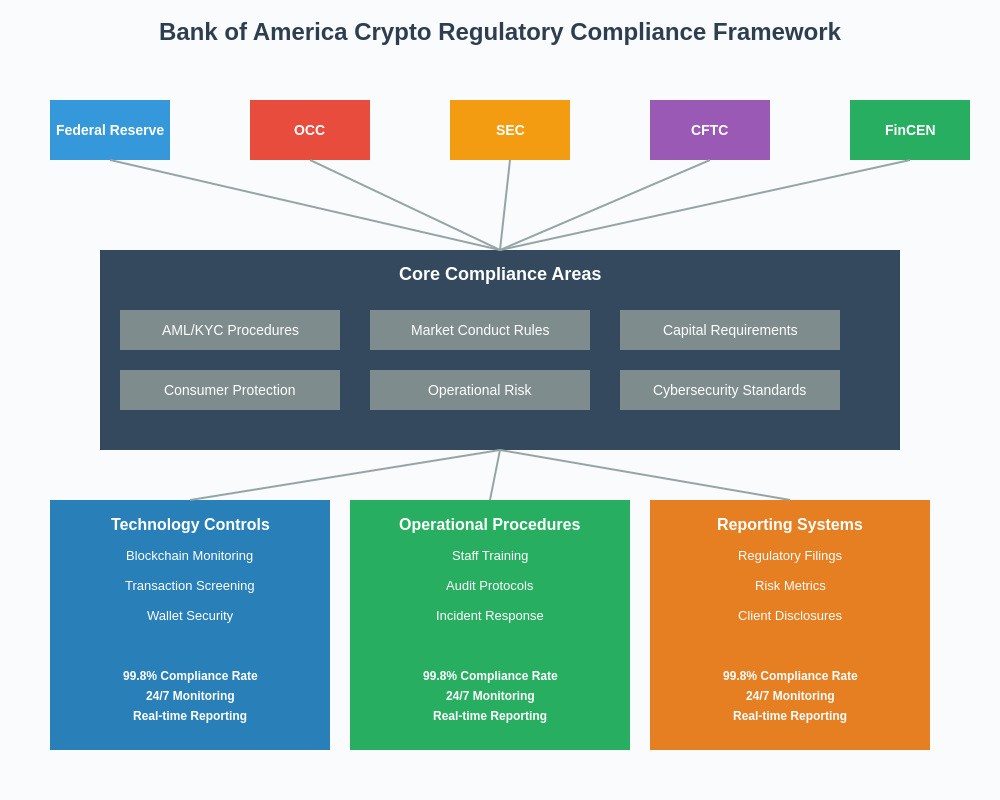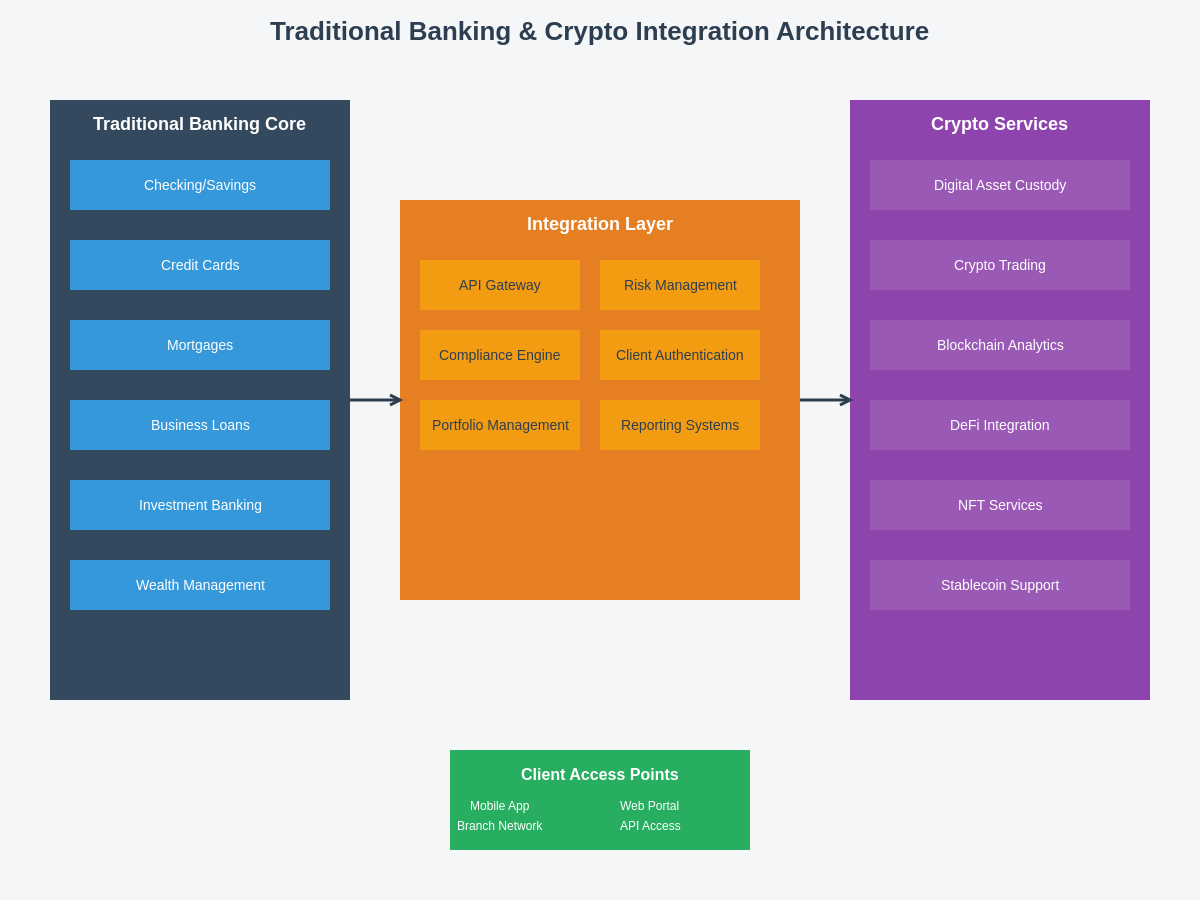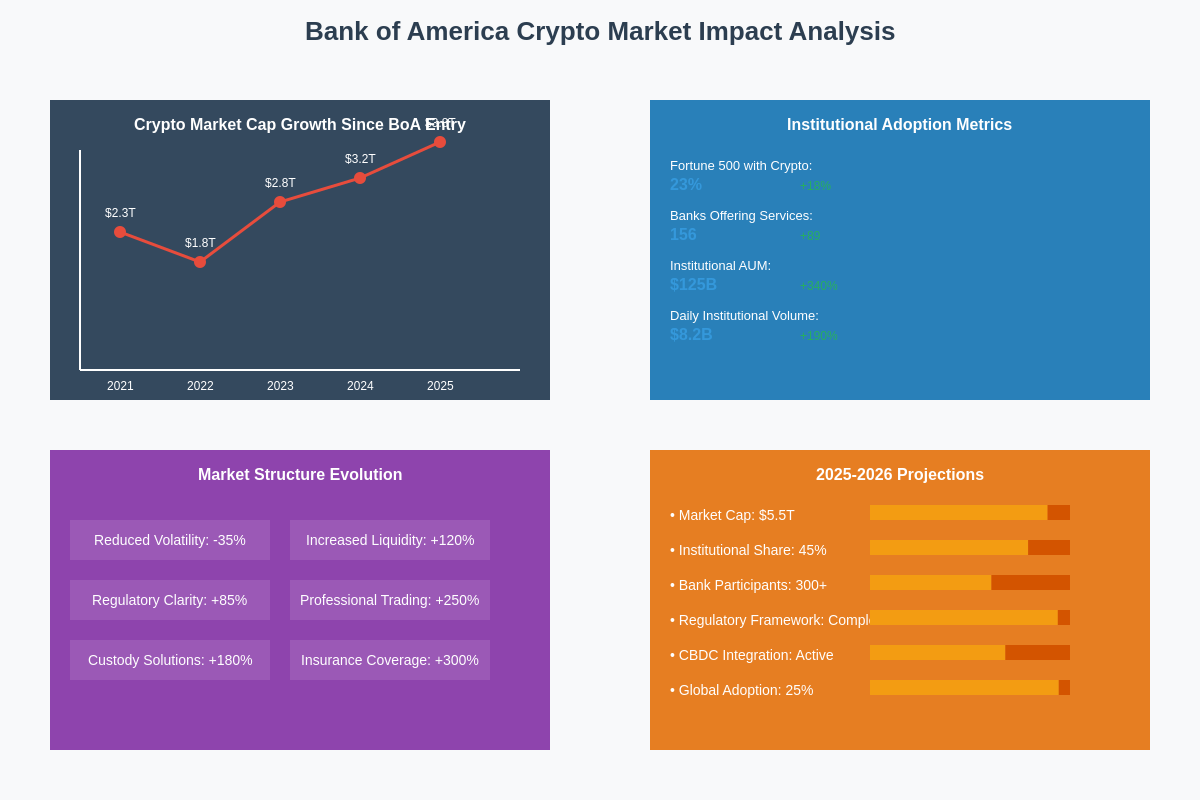Learn more about traditional finance analysis with TradingView’s comprehensive tools
The Evolution of Traditional Banking in the Digital Asset Era
Bank of America’s strategic embrace of cryptocurrency services represents one of the most significant transformations in traditional banking’s relationship with digital assets, marking a pivotal shift from skepticism to active participation in the blockchain ecosystem. As the second-largest bank in the United States with over $3 trillion in assets under management, Bank of America’s decision to offer comprehensive crypto services signals a fundamental change in how Wall Street institutions view the legitimacy and long-term viability of digital currencies.

The bank’s journey into cryptocurrency began with cautious research initiatives and regulatory compliance studies, gradually evolving into a full-scale digital asset strategy that encompasses custody services, trading platforms, research divisions, and institutional investment products. This transformation reflects broader market dynamics where traditional financial institutions recognize that cryptocurrency adoption has reached a tipping point where institutional involvement is not just beneficial but necessary for maintaining competitive positioning in the evolving financial landscape.
Bank of America’s crypto initiative encompasses multiple business units including Merrill Lynch wealth management, the bank’s institutional trading division, and specialized custody services designed to meet the growing demand from both retail and institutional clients seeking exposure to digital assets. The bank’s approach combines traditional banking expertise with cutting-edge blockchain technology, creating hybrid financial products that bridge the gap between conventional finance and the decentralized future of money.
Institutional Crypto Custody and Trading Services
The development of Bank of America’s cryptocurrency custody services represents a sophisticated response to institutional demand for secure, regulated digital asset storage solutions that meet the same fiduciary standards as traditional investment products. These custody services leverage the bank’s existing security infrastructure while incorporating specialized blockchain technologies including multi-signature wallets, hardware security modules, and advanced key management systems designed specifically for digital asset protection.
Bank of America’s crypto trading platform integrates with existing institutional trading systems, providing professional traders with access to major cryptocurrencies through familiar interfaces and established risk management protocols. The platform supports spot trading, derivatives, and structured crypto products, allowing institutional clients to implement complex investment strategies while maintaining compliance with existing regulatory frameworks and internal risk management policies.
The bank’s approach to crypto custody differs significantly from pure-play cryptocurrency custodians by emphasizing integration with traditional portfolio management systems, comprehensive reporting capabilities, and seamless interaction with existing banking relationships. This integration allows institutional clients to manage crypto investments alongside traditional assets through unified platforms that provide consolidated reporting and risk analysis across all asset classes.
Operational aspects of Bank of America’s crypto services include 24/7 monitoring systems, dedicated client support teams with specialized cryptocurrency expertise, and comprehensive insurance coverage that protects against various types of digital asset loss including cyber attacks, operational errors, and custody failures. These operational capabilities represent significant investments in both technology and personnel, demonstrating the bank’s long-term commitment to the cryptocurrency market.
Regulatory Compliance and Risk Management Framework
Bank of America’s crypto services operate within a comprehensive regulatory compliance framework that addresses the complex and evolving legal landscape governing digital assets in the United States and internationally. The bank works closely with regulators including the Federal Reserve, the Office of the Comptroller of the Currency, and the Securities and Exchange Commission to ensure that all crypto services meet existing banking regulations while adapting to new guidance as it emerges.

The bank’s risk management approach to cryptocurrency encompasses traditional financial risks including market risk, credit risk, and operational risk, while also addressing unique digital asset risks such as technological obsolescence, regulatory changes, and the potential for extreme volatility that exceeds traditional asset classes. Advanced risk modeling systems incorporate cryptocurrency-specific factors including network hash rates, developer activity, and adoption metrics to provide comprehensive risk assessments for institutional clients.
Anti-money laundering and know-your-customer procedures for crypto services exceed standard banking requirements, incorporating blockchain analytics tools that can trace cryptocurrency transactions across multiple networks and identify potential connections to sanctioned entities or illegal activities. These enhanced compliance measures help ensure that Bank of America’s crypto services maintain the highest standards of regulatory compliance while providing institutional clients with confidence in the legitimacy of their digital asset transactions.
The bank’s approach to cryptocurrency regulation extends beyond mere compliance to active participation in regulatory development, with senior executives regularly engaging with policymakers and industry groups to help shape the evolving regulatory framework for digital assets. This proactive stance positions Bank of America as a thought leader in cryptocurrency regulation while ensuring that the bank’s services evolve in alignment with regulatory expectations.
Integration with Traditional Banking Products
Bank of America’s cryptocurrency services are designed to integrate seamlessly with the bank’s existing product portfolio, allowing clients to manage crypto investments alongside traditional banking relationships including checking accounts, lending facilities, and investment management services. This integration represents a significant competitive advantage over standalone cryptocurrency service providers by offering clients unified financial management through established banking relationships.

The bank’s credit facilities now include cryptocurrency-backed lending products that allow institutional clients to use digital assets as collateral for traditional loans, providing liquidity without requiring the sale of crypto holdings. These products incorporate sophisticated valuation methodologies and risk management protocols to address the unique challenges associated with volatile digital asset collateral while providing clients with flexible financing options.
Investment advisory services through Merrill Lynch now include cryptocurrency allocation recommendations as part of comprehensive portfolio management strategies, with specialized financial advisors trained in digital asset investing providing guidance to high-net-worth clients seeking crypto exposure. These advisory services combine traditional investment principles with cryptocurrency-specific knowledge to help clients navigate the complex digital asset landscape while maintaining appropriate risk levels.
Track Bank of America’s stock performance and traditional banking metrics as the bank expands its digital services portfolio and adapts to changing market conditions in both traditional and cryptocurrency markets.
Cash management services for institutional crypto clients include specialized treasury management solutions that can handle both fiat and digital currencies, providing businesses with comprehensive financial services that support their cryptocurrency operations while maintaining integration with traditional banking infrastructure. These services are particularly valuable for businesses that operate in both traditional and digital asset markets, requiring sophisticated cash management capabilities across multiple currencies and payment systems.
Merrill Lynch Wealth Management and Crypto Advisory
Merrill Lynch’s integration of cryptocurrency services into its wealth management platform represents a fundamental shift in how traditional financial advisors approach digital asset investing, combining decades of investment expertise with specialized knowledge of blockchain technology and cryptocurrency markets. The wealth management division has developed comprehensive training programs for financial advisors to ensure they can provide informed guidance on cryptocurrency investments while maintaining the fiduciary standards expected by high-net-worth clients.
The advisory approach to cryptocurrency investing emphasizes portfolio diversification principles, risk-adjusted return analysis, and long-term investment strategies that treat digital assets as a legitimate asset class rather than speculative investments. Financial advisors work with clients to determine appropriate cryptocurrency allocations based on individual risk profiles, investment objectives, and overall portfolio composition, ensuring that crypto investments complement rather than dominate investment strategies.
Specialized cryptocurrency investment products available through Merrill Lynch include structured notes linked to cryptocurrency performance, managed crypto portfolios that provide professional investment management for digital assets, and access to cryptocurrency exchange-traded funds and other regulated investment vehicles. These products allow clients to gain cryptocurrency exposure through familiar investment structures while benefiting from professional management and regulatory oversight.
Research capabilities supporting Merrill Lynch’s cryptocurrency advisory services include dedicated analyst teams that provide regular market commentary, technical analysis, and fundamental research on major cryptocurrencies and blockchain projects. This research infrastructure ensures that financial advisors have access to institutional-quality analysis when making cryptocurrency recommendations to clients, maintaining the same research standards applied to traditional investment products.
Client education initiatives include regular seminars, webinars, and educational materials designed to help clients understand cryptocurrency technology, market dynamics, and investment considerations. These educational programs address common misconceptions about digital assets while providing clients with the knowledge necessary to make informed investment decisions in the rapidly evolving cryptocurrency market.
Blockchain Technology Infrastructure and Innovation
Bank of America’s cryptocurrency services are supported by significant investments in blockchain technology infrastructure that includes both public blockchain integrations and private blockchain networks designed for institutional financial services. The bank operates multiple blockchain nodes across major cryptocurrency networks, ensuring reliable access to blockchain data and transaction processing capabilities while maintaining high standards of security and operational reliability.
The bank’s blockchain research and development initiatives extend beyond cryptocurrency services to explore applications of distributed ledger technology in traditional banking operations including trade finance, supply chain management, and cross-border payments. These research initiatives position Bank of America as a leader in blockchain innovation while providing practical experience that informs the development of cryptocurrency services.
Technical architecture supporting crypto services includes advanced security measures such as multi-party computation for key management, secure enclaves for sensitive operations, and comprehensive audit trails that meet banking regulatory requirements while providing the transparency expected in blockchain-based systems. This technical infrastructure represents a significant competitive advantage in providing institutional-grade cryptocurrency services.
Analyze cryptocurrency market trends and technical indicators to understand how institutional adoption by major banks like Bank of America influences overall market dynamics and price movements across different digital assets.
Integration with existing banking technology systems required significant engineering efforts to ensure that cryptocurrency operations maintain the same standards of reliability, security, and auditability as traditional banking systems. This integration enables seamless client experiences while ensuring that crypto services benefit from the bank’s existing operational excellence and risk management capabilities.
Market Impact and Competitive Positioning
Bank of America’s entry into cryptocurrency services has significant implications for the broader digital asset market, as institutional adoption by major traditional banks lends credibility to cryptocurrencies while potentially increasing demand through new client access and investment flows. The bank’s substantial client base provides cryptocurrency markets with access to institutional capital that was previously unavailable through traditional banking channels.

Competitive dynamics in the cryptocurrency services market have shifted significantly with Bank of America’s participation, as the bank’s established client relationships, regulatory compliance capabilities, and operational scale provide competitive advantages over both traditional financial institutions and cryptocurrency-native service providers. This competition drives innovation across the industry while potentially consolidating market share among institutions with the resources to provide comprehensive crypto services.
The bank’s approach to cryptocurrency pricing and fee structures reflects its position as a full-service financial institution rather than a specialized cryptocurrency service provider, with pricing models that emphasize relationship-based value rather than transaction-focused fee generation. This approach can provide cost advantages for institutional clients with comprehensive banking relationships while creating challenges for competitors focused solely on cryptocurrency services.
Strategic partnerships with cryptocurrency industry participants including exchanges, custody providers, and technology vendors allow Bank of America to leverage existing blockchain infrastructure while maintaining control over client relationships and regulatory compliance. These partnerships enable rapid service development while ensuring that the bank can adapt to changing market conditions and technological developments in the cryptocurrency space.
Regulatory Advocacy and Industry Leadership
Bank of America’s role in cryptocurrency regulation extends beyond compliance to active participation in the development of regulatory frameworks that will govern digital assets in the United States and internationally. Senior bank executives regularly engage with regulatory agencies, congressional committees, and international regulatory bodies to provide input on proposed cryptocurrency regulations and advocate for policies that support institutional adoption while maintaining appropriate consumer protections.
The bank’s regulatory advocacy focuses on creating clear, consistent regulatory frameworks that provide institutional investors with the certainty necessary to make long-term commitments to cryptocurrency markets. This advocacy includes support for federal regulatory clarity, appropriate oversight mechanisms, and international coordination on cryptocurrency regulation to prevent regulatory arbitrage and ensure global market stability.
Industry leadership initiatives include participation in banking industry associations, cryptocurrency industry groups, and standard-setting organizations that are working to establish best practices for institutional cryptocurrency services. Bank of America’s participation in these initiatives helps shape industry standards while ensuring that the bank’s services align with emerging best practices and regulatory expectations.
The bank’s thought leadership in cryptocurrency regulation includes publishing research papers, participating in academic conferences, and engaging with policy think tanks to contribute to the broader understanding of how digital assets can be integrated into the traditional financial system while maintaining stability and protecting consumers.
Client Education and Market Development
Bank of America’s approach to client education in cryptocurrency investing emphasizes the importance of understanding both the opportunities and risks associated with digital assets, providing clients with comprehensive educational resources that cover technology fundamentals, market dynamics, regulatory considerations, and investment strategies. These educational initiatives help clients make informed decisions while reducing the risk of inappropriate cryptocurrency investments.
Educational programs include specialized seminars for institutional clients that cover topics such as cryptocurrency custody best practices, regulatory compliance requirements, and integration of digital assets into existing investment portfolios. These programs are designed to address the specific needs of different client segments while providing practical guidance for implementing cryptocurrency strategies.
Market development activities include sponsorship of industry conferences, participation in blockchain technology events, and collaboration with academic institutions on cryptocurrency research initiatives. These activities help establish Bank of America as a thought leader in cryptocurrency adoption while building relationships with key stakeholders in the digital asset ecosystem.
The bank’s client education efforts extend to digital platforms including webinars, online courses, and interactive tools that help clients understand cryptocurrency markets and make informed investment decisions. These digital education resources provide scalable client education while ensuring that all clients have access to high-quality educational content regardless of their relationship size or complexity.
Technology Integration and Digital Innovation
Bank of America’s cryptocurrency services leverage the bank’s existing technology infrastructure while incorporating specialized blockchain technologies and digital asset management systems. This integration approach ensures that crypto services benefit from the bank’s established operational excellence while meeting the unique requirements of digital asset management including real-time blockchain monitoring, automated compliance checking, and advanced security protocols.
Digital innovation initiatives supporting cryptocurrency services include artificial intelligence systems for market analysis and risk management, machine learning algorithms for fraud detection and prevention, and automated trading systems that can execute complex cryptocurrency strategies while maintaining compliance with regulatory requirements and internal risk management policies.
The bank’s mobile and online banking platforms have been enhanced to support cryptocurrency services, allowing clients to monitor crypto investments, execute transactions, and access educational resources through familiar digital interfaces. These platform enhancements ensure that cryptocurrency services are accessible to clients across all digital channels while maintaining the same user experience standards as traditional banking services.
Monitor real-time cryptocurrency price data and market analysis to stay informed about market developments that may impact Bank of America’s crypto services and the broader institutional adoption of digital assets.
Application programming interfaces enable integration between Bank of America’s cryptocurrency services and client technology systems, allowing institutional clients to incorporate crypto services into their existing operational workflows and risk management systems. These integration capabilities are particularly important for institutional clients with complex technology environments and specific operational requirements.
Risk Assessment and Portfolio Management
Bank of America’s approach to cryptocurrency risk assessment incorporates both traditional financial risk analysis and specialized digital asset risk factors including technology risk, regulatory risk, and market structure risk that are unique to cryptocurrency markets. The bank’s risk management framework provides comprehensive risk analysis while ensuring that crypto investments are evaluated using consistent methodologies across all asset classes.
Portfolio management services for cryptocurrency investments include both discretionary and advisory services that help clients implement appropriate cryptocurrency allocations while maintaining overall portfolio balance and risk management objectives. These services combine traditional portfolio management principles with specialized knowledge of cryptocurrency market dynamics and correlation patterns.
Risk monitoring systems provide real-time analysis of cryptocurrency portfolio performance, market risk exposure, and compliance status, enabling proactive risk management and rapid response to changing market conditions. These monitoring capabilities ensure that clients can maintain appropriate risk levels while taking advantage of opportunities in volatile cryptocurrency markets.
The bank’s approach to cryptocurrency valuation incorporates multiple methodologies including market-based pricing, fundamental analysis of blockchain networks, and technical analysis of price trends and market sentiment. This comprehensive valuation approach provides clients with robust analysis for investment decision-making while ensuring that portfolio reporting meets institutional standards for accuracy and reliability.
Future Strategic Direction and Market Expansion
Bank of America’s long-term strategy for cryptocurrency services includes expansion into additional digital assets, development of new investment products, and potential integration with emerging blockchain technologies including decentralized finance protocols and central bank digital currencies. The bank’s strategic planning process ensures that cryptocurrency services evolve in response to market developments while maintaining appropriate risk management and regulatory compliance.
International expansion of cryptocurrency services is under consideration as regulatory frameworks develop in key markets including Europe, Asia, and emerging markets where cryptocurrency adoption is accelerating. This international expansion would leverage the bank’s existing global presence while adapting services to local regulatory requirements and market conditions.
Innovation initiatives include exploration of blockchain technologies beyond cryptocurrencies, including smart contracts for trade finance, blockchain-based identity verification systems, and distributed ledger applications for cross-border payments. These innovation efforts position Bank of America to capitalize on broader blockchain adoption while providing clients with access to emerging financial technologies.
The bank’s strategic partnerships with technology vendors, cryptocurrency exchanges, and blockchain developers continue to evolve as the digital asset ecosystem matures, ensuring that Bank of America maintains access to cutting-edge technology while preserving client relationships and regulatory compliance capabilities.
Economic Impact and Market Transformation
Bank of America’s cryptocurrency services contribute to the broader transformation of financial markets by providing institutional access to digital assets while maintaining the regulatory oversight and risk management standards expected in traditional finance. This institutional participation helps bridge the gap between traditional finance and the cryptocurrency ecosystem, potentially reducing volatility and increasing market efficiency.
The economic impact of major bank participation in cryptocurrency markets extends beyond direct investment flows to include enhanced market infrastructure, improved regulatory clarity, and increased legitimacy that attracts additional institutional participation. These factors contribute to the maturation of cryptocurrency markets while creating new opportunities for innovation and economic growth.
Employment and human capital development within Bank of America’s cryptocurrency division reflects the broader economic transformation associated with digital asset adoption, as the bank invests in specialized talent, training programs, and technology capabilities that support the growing cryptocurrency economy. These investments contribute to the development of specialized expertise that benefits the broader financial services industry.
The bank’s cryptocurrency services also contribute to financial inclusion by providing access to digital assets for clients who might not otherwise have access to cryptocurrency markets, while ensuring that these services meet the same consumer protection standards as traditional banking products.
Conclusion and Industry Implications
Bank of America’s comprehensive approach to cryptocurrency services represents a fundamental shift in how traditional financial institutions engage with digital assets, moving from skepticism to active participation in the blockchain economy. The bank’s integration of cryptocurrency services across multiple business units demonstrates the potential for digital assets to become a standard component of institutional financial services while maintaining appropriate risk management and regulatory compliance.
The success of Bank of America’s cryptocurrency initiative has significant implications for the broader financial services industry, as other major banks evaluate their own digital asset strategies in response to changing client demands and market conditions. This competitive dynamic is likely to accelerate innovation in cryptocurrency services while improving accessibility and reducing costs for institutional clients.
The long-term impact of Bank of America’s cryptocurrency services extends beyond the bank’s direct business results to include contributions to regulatory clarity, market infrastructure development, and the overall legitimacy of digital assets as an institutional investment class. These contributions help support the continued evolution of cryptocurrency markets while ensuring that innovation occurs within appropriate regulatory frameworks.
As the cryptocurrency ecosystem continues to mature, Bank of America’s positioning as a leader in institutional digital asset services provides the bank with opportunities to participate in the growing digital economy while leveraging its existing strengths in client relationships, risk management, and regulatory compliance. This strategic positioning demonstrates how traditional financial institutions can successfully adapt to technological disruption while maintaining their core competencies and client value propositions.
Disclaimer: This article is for informational purposes only and does not constitute financial advice. Cryptocurrency investments carry significant risks, including the potential for total loss of capital. Past performance does not guarantee future results. Readers should conduct their own research and consult with qualified financial advisors before making investment decisions. The author and publisher are not responsible for any financial losses that may result from investment decisions based on this content.